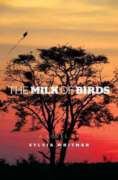
When a nonprofit organization called Save the Girls pairs a fourteen-year-old Sudanese refugee with an American teenager from Richmond, Virginia, the pen pals teach each other compassion and share a bond that bridges two continents.
Featured in Volume VI, Issue 1 of WOW Review.
- ISBN: 9781442446823
- Published: 2013 , Atheneum Books for Young Readers
- Themes: Friendship, girls and women, Letter Writing, Refugee camp, Refugees
- Descriptors: Africa, Realistic Fiction, Sudan, Young Adult (ages 14-18)

Marilyn
I found this story about two female teenagers engrossing but upsetting. To me that is a plus of the book. The author shows us the human cost of the terrors in Darfur and gives us information that builds our empathy for the people who are suffering. The teens in the story, Nawra who is trapped in a refugee camp in Darfur, and K.C. an American girl tell their stories in alternating chapters and letters. The girls are connected through a nonprofit organization who finds American donors that will offer support to the girls in the refugee camp and correspond with them. K.C.’s mother has sent $30 for Nawra and signed up K.C. to writes letters to her. K.C. is struggling in school and resists another literacy demand in her life. As their stories unfold we learn that Nawra is pregnant raped by the Janjaweeds as she tried to escape their attack on her village. K.C.’s troubles with school and her mom seem trivial in comparison.
In a posting on the WOW website under Authors Corner, the author, Sylvia Whitman, of The Milk of Birds writes: “The Milk of Birds isn’t a story about Darfur; it’s a story about a relationship. … The Milk of Birds is a work of fiction. Whatever truth it claims lies in the connection between K.C. and Nawra. They never meet, and yet they save each other.”
I am wondering what you think of the author’s quote, Holly? The story of the refugee camp in Darfur and the tremendous challenges that Nawra and her family and friends experience will be new to the reader’s of this book. The relationship between the girls is strength of the book. However, will that part of the story stand out for audience of the book? I found the story to be a page turner, but I am concerned by how the white people once again save the poor Africans. I am looking forward to “Your Take” on this book, Holly.
Holly
I agree, Marilyn, the book is engrossing, but upsetting. There were times I just had to set the book aside, it so disturbed me. Not only were the events horrific; they reminded me of my own powerlessness to remedy the pain both girls were experiencing. Nawra’s story is horrifying, yet bears witness to what is happening in Sudan even yet. While the author suggests this is not a book about Darfur, I still found myself googling about what was happening in Sudan and then watched a report on the news about a young Sudanese girl reunited with her family after 8 years of being separated from her family during their migration to the camps. In respect to K.C.’s story, the power is in her path toward more literate behavior, and reminds me that whatever interests young people is what should be used to create the opportunity to utilize their literacies in authentic ways. Nawra gave K.C. that opportunity. I also thought about the juxtaposition of each of the girl’s lives, and found that I didn’t want to compare their stories in measuring tragedy. Both girls were displaced, Nawra’s story may seem more horrendous, but K.C. also faced displacement in connection to her learning and an abandonment of her dad and a way of life, which is also destructive.
I love the author’s idea that while the girls never meet, they save each other. That just reminds me that we may never know what good can come of our positive actions, our encouragement—even of a brief conversation on the street—that may save another (in whatever way that might take). I read once that “we can listen others into existence.” That is powerful. These two girls “listened,” “wrote,” and “read” themselves and each other into a bigger existence than their current lives. That is the power of this story for me, and the learning I take from it. The concern about the Western world saving those in Darfur is a reflection of a reality that has me hoping that while the Western world does so, it should also help build the human infrastructure in the Sudan so dependence is only short-lived. We have to balance goodwill and concern with domination all the time. It is a tough balancing act. What other thoughts came to you about this book, Marilyn?
Marilyn
Thank you, Holly. You made me see this book in a new light. Your comment about “a tough balancing act,” was key in bringing me a new view of this book. I realized that Sylvia Whitman does an excellent job of balancing the stories of the two girls in another way. Whitman creates a structure that helps young readers understand both stories through the lens of the familiar one of the American girl. By doing this she illuminates the challenges both girls experience.
This book reminds me of two other books about Sudan. It would be good to connect The Milk of Birds with A Long Walk to Water by Linda Sue Parks and Brothers in Hope: The Story of the Lost Boys of Sudan by Mary Williams.
Holly
Yes, those would be some nice books to use as companions to The Milk of Birds. I hope young people will take the challenge of reading about the difficulties of our world and think of positive ways to bring change, as it is so needed.